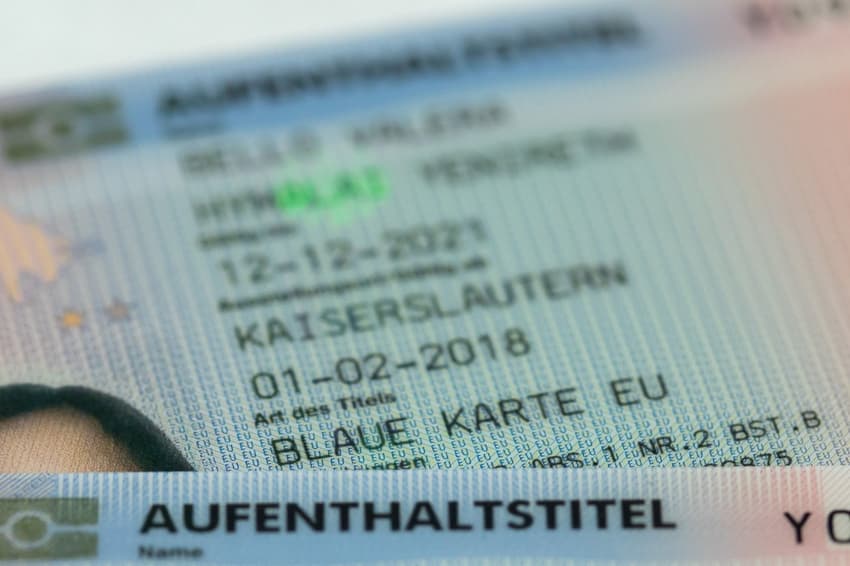What happens to your EU Blue Card if you lose your job in Germany?

Losing your job can be an unpleasant experience at the best of times. But if it’s tied to your residency title, things can get much more stressful. Here’s what EU Blue Card holders in Germany need to know.
What is the EU Blue Card?
The EU Blue Card is a temporary residence title that is available to university graduates from non-EU countries. It is generally issued for a period of four years, or, if the employment contract is for a period of fewer than four years, it is issued for the duration of the employment contract plus three months.
In Germany, the EU Blue Card has been the main residence title for qualified professionals from abroad since August 1st, 2012.
Who can get an EU Blue Card?
In order to get an EU Blue Card, foreigners moving to Germany need to have a university degree, an employment contract or a binding job offer for a position with a minimum annual gross salary of €58,400.
READ ALSO: How to get fast-track permanent residency rights in Germany
For jobs in the fields of mathematics, computer science, natural sciences, engineering and human medicine (excluding dentistry), a reduced minimum annual gross salary of €45,552 applies in 2023 (salary limits are adjusted for each calendar year).
Will I lose my Blue Card if I change or lose my job?
You won't automatically lose your Blue Card if you lose your job or decide to move to another company.
However, if you change jobs within the first two years of being employed in Germany, you will need to get approval from the local foreigners' authority, who will check if the conditions for issuing a new Blue Card are met.
If you lose your job, you have a three-month period during which you can look for another qualified position. If you find a new job within this time, you will then have to get a new German Blue Card updated with your new employment details.
READ ALSO: 'Traumatising': Foreign residents share stories from German immigration offices
If you don't manage to find a new job within the three-month time frame, you can apply for a residence title for a job search - an Aufenthaltserlaubnis zur Arbeitsplatzsuche - which can be issued for a maximum period of six months. Within this period, you will need to find a job that relates to your qualifications.
How many Blue Card holders are there in Germany?
According to the figures from the Federal Office for Migration and Refugees, at the end of 2021, there were around 70,000 EU Blue Card holders registered as living in Germany.
Comments (1)
See Also
What is the EU Blue Card?
The EU Blue Card is a temporary residence title that is available to university graduates from non-EU countries. It is generally issued for a period of four years, or, if the employment contract is for a period of fewer than four years, it is issued for the duration of the employment contract plus three months.
In Germany, the EU Blue Card has been the main residence title for qualified professionals from abroad since August 1st, 2012.
Who can get an EU Blue Card?
In order to get an EU Blue Card, foreigners moving to Germany need to have a university degree, an employment contract or a binding job offer for a position with a minimum annual gross salary of €58,400.
READ ALSO: How to get fast-track permanent residency rights in Germany
For jobs in the fields of mathematics, computer science, natural sciences, engineering and human medicine (excluding dentistry), a reduced minimum annual gross salary of €45,552 applies in 2023 (salary limits are adjusted for each calendar year).
Will I lose my Blue Card if I change or lose my job?
You won't automatically lose your Blue Card if you lose your job or decide to move to another company.
However, if you change jobs within the first two years of being employed in Germany, you will need to get approval from the local foreigners' authority, who will check if the conditions for issuing a new Blue Card are met.
If you lose your job, you have a three-month period during which you can look for another qualified position. If you find a new job within this time, you will then have to get a new German Blue Card updated with your new employment details.
READ ALSO: 'Traumatising': Foreign residents share stories from German immigration offices
If you don't manage to find a new job within the three-month time frame, you can apply for a residence title for a job search - an Aufenthaltserlaubnis zur Arbeitsplatzsuche - which can be issued for a maximum period of six months. Within this period, you will need to find a job that relates to your qualifications.
How many Blue Card holders are there in Germany?
According to the figures from the Federal Office for Migration and Refugees, at the end of 2021, there were around 70,000 EU Blue Card holders registered as living in Germany.
Join the conversation in our comments section below. Share your own views and experience and if you have a question or suggestion for our journalists then email us at [email protected].
Please keep comments civil, constructive and on topic – and make sure to read our terms of use before getting involved.
Please log in here to leave a comment.